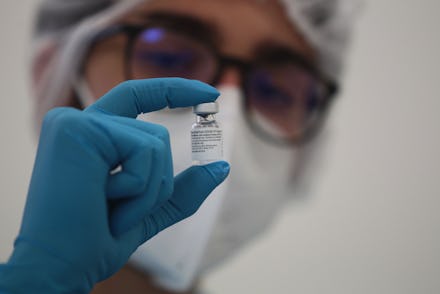Of course the coronavirus vaccine rollout is going horribly

Somewhere between "light at the end of the tunnel" and "this is why we can't have nice things" lies America's ongoing inability to grapple with the coronavirus pandemic that has already claimed the lives of at least 340,000 people in the country to date. Yes, multiple drugmakers have released multiple vaccines with seemingly promising results. But as we head into what is likely to be a devastating plague winter, it's become clear that making the vaccine was only the first step — actually getting it to the people who need it most is a different catastrophe altogether.
In the waning hours of 2020, some 2.7 millions of Americans had received their first of two COVID-19 vaccine doses, according to the CDC's tracking database. And while that's, y'know, good, it's nowhere near the 20 million-person end-of-year milestone promised by Health and Human Services Secretary Alex Azar, to say nothing of the 100 million-person goal proclaimed by President Donald Trump this past fall.
The rollout of what is perhaps the single most widely anticipated medical breakthrough since the polio vaccine has, to put it mildly, been a disaster.
"We would have liked to have seen it run smoothly and have 20 million doses into people today by the end of the 2020, which was the projection," Dr Antony Fauci admitted Tuesday. "Obviously, it didn't happen, and that's disappointing."
"Disappointing" is one way to put it. Another way is to say that at our current rate of inoculations, it will take nearly a decade to reach the sort of herd immunity levels necessary to actually control coronavirus, according to New York magazine.
That's not disappointing, that's practically criminal.
Much of the problem, it turns out, is a matter of distribution. By once again pushing the responsibility to the individual states — much like he did with regards to medical care and equipment in the early stages of the pandemic — Trump has essentially hamstrung the vaccine's roll out, taking what could and should have been a smooth federal program and turning it into a helter-skelter disaster.
In part, that process has been hampered by the realities of what this particular suite of vaccines requires — specifically, varying degrees of cold transportation and storage, as well as careful monitoring of expiration deadlines. Vaccine stocks could be rendered obsolete if not administered within the proper window of time, and with storage options limited, the movement and stockpiling of the various vaccines means that the efficacy window is further complicated by the requisite logistics of actually getting the stuff out of the vials and into people's arms.
In Wisconsin, for example, a hospital employee was fired after "intentionally" removing 500 doses of the vaccine from refrigeration, prompting the hospital to discard the entire batch. After an investigation, the hospital determined that the former employee had taken the doses out of the cold storage unit to "access other items" and as a result of "unintended human error" had neglected to return them when they were done.
It's a frustrating episode that highlights just how necessarily complicated — and delicate — the rollout process has become. That there has been an extended congressional loggerhead over the coronavirus aid package containing money earmarked for distribution has only accentuated the existing pitfalls of trying to provide a time-sensitive injection to hundreds of millions of people as quickly and efficiently as possible.
And even if the logistical issues are resolved, there's still the outstanding problem of the politicization of the vaccine itself. Efforts to enact mass vaccine refusal have popped up across social media, with a considerable portion of the country signaling they will simply not participate in any vaccination plan within the first year.
So here we are, in the last few hours of 2020 — a year marked by disease and despair. And while the mere existence of the vaccine means there is some eventual end in sight, the past few weeks have proven that we're nowhere near the point of optimism. Not yet, anyway.